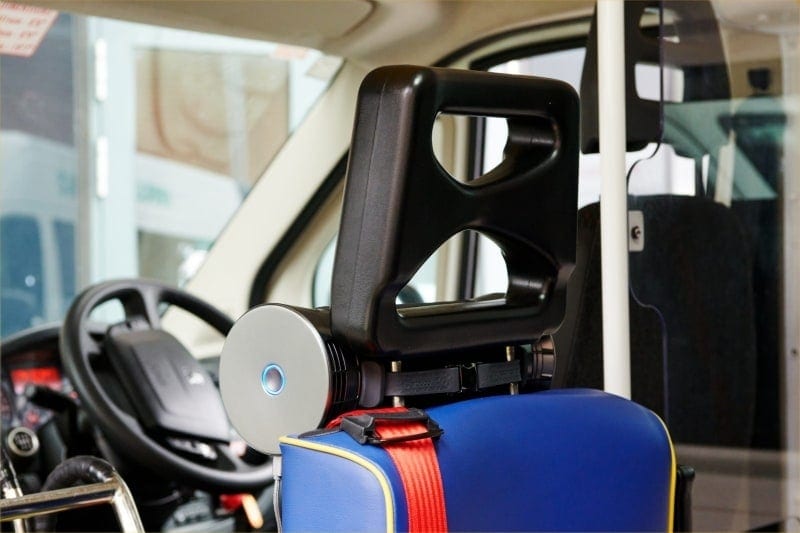HATS group fits Airbubbl air cleaners to 100 cars used for Covid-19 patient transport

Leading healthcare transport provider HATS Group is equipping 100 of its vehicles with AirBubbl air-filtration devices, following research that suggests they can lower the risk of drivers contracting the Covid-19 virus.
The fleet is used to provide transport services to London hospitals dealing with the crisis, including those who are known or suspected coronavirus carriers.
The Airbubbl device, developed by AirLabs, is designed to reduce pollution levels within vehicles by extracting particulates from the atmosphere and filtering them out, thus cleaning the air inside the car.
But as the Covid-19 virus is of a similar size, AirLabs says the Airbubbl can remove the airborne virus particles from the air circulating inside the cab. AirLabs claims the device can remove more than 95% of airborne particles that pass through the filter.
Airbubbl is a compact, 310mm long cylindrical device with pre-installed filters. It plugs in to a USB socket inside the car and can be easily attached using a crash-tested strap, around the headrest supports of one of the front seats. Operation is simple – a quiet internal fan sucks air into the cylinder, through the filters and expels freshened air out of the other end at a rate of 30 cubic metres per hour.
The AirBubbl contains patented filtration and air flow technology that removes particulates such as dust, pollen, soot, fibres, PM2.5 and PM10, along with bacteria and viruses and gaseous pollutants such as Nitrogen Dioxide (NO2), Ozone and Volatile Organic Compounds (VOCs).
It collects the particles on a filter, which should be changed every 1,000 hours. Once the virus becomes caught in the filter, it dies off after a period of 24 hours maximum.
Coronaviruses are spread via respiratory droplets produced by infected persons when they cough, sneeze, talk or breathe. While larger droplets quickly fall out of the air, smaller droplets persist as aerosols. These aerosols provide an environment in which viruses can remain alive for hours allowing them to spread through the environment, according to recent studies from MIT and the New England Journal of Medicine. Droplets and bioaerosols also lead to the contamination of surfaces, another route of transmission.
By installing air filtration devices, alongside thorough cleaning of the vehicles with antiviral chemicals, and the wearing of protective masks for drivers, HATS is seeking to minimise the risk of exposure to the virus for staff who come into close contact with infected patients in confined spaces.
Matthew Johnson, professor of chemistry at University of Copenhagen and chief science officer at AirLabs, said: “Our focus here is on reducing exposure for workers who cannot avoid close contact with coronavirus patients, and for anyone working in essential jobs in enclosed spaces.
“The science shows that by installing air filtration devices in vehicles, it is possible to remove more than 95% of airborne particles. By decreasing the concentration of airborne particles that could contain the virus being breathed in by workers in critical environments, we reduce the risk of them being infected.
HATS originally ordered 100 AirBubbl air filtration devices from AirLabs to protect its drivers and passengers from London air pollution. Its vehicles are now being repurposed to support London hospitals, including Chelsea and Westminster NHS Foundation Trust and St George’s Hospital, which are putting protective measures in place to manage the crisis.
Ashley Stowell, Advanced Paramedic Practitioner and Clinical Director for HATS, said: “We decided to ramp up installation, along with the rapid deployment of extra vehicles for a number of additional services, including ITU transfers of Covid-19 patients and maternity services to a number of Hospital Trusts across London, in a bid to help reduce the cross infection on this mountain we are all having to climb.”
John Wenger, Professor of Physical Chemistry at University College Cork and Director of the Centre for Research into Atmospheric Chemistry, said: “Dose matters and higher exposures can lead to more severe illness. There is an obvious need for methods to reduce airborne transmission right now for people who cannot avoid contact with the public.”
HATS is a leading provider of healthcare transport services supporting the NHS, mental health trusts, local authorities, other public sector bodies as well as private medical institutions. HATS operates London-wide and reaches into the home counties. The company also provides school transport for children with Special educational needs and disabilities and has a fleet of more than 800 adapted vehicles with highly trained specialist crews, including paramedics.
